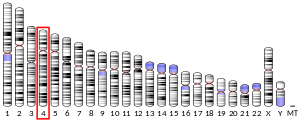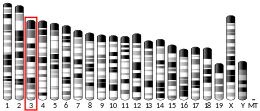BBS7
Bardet-Biedl syndrome 7 is a protein that in humans is encoded by the BBS7 gene.[5]
Mutations in this gene are associated with the Bardet-Biedl syndrome.[5]
References
- 1 2 3 GRCh38: Ensembl release 89: ENSG00000138686 - Ensembl, May 2017
- 1 2 3 GRCm38: Ensembl release 89: ENSMUSG00000037325 - Ensembl, May 2017
- ↑ "Human PubMed Reference:".
- ↑ "Mouse PubMed Reference:".
- 1 2 Badano JL, Ansley SJ, Leitch CC, Lewis RA, Lupski JR, Katsanis N (March 2003). "Identification of a novel Bardet-Biedl syndrome protein, BBS7, that shares structural features with BBS1 and BBS2". Am. J. Hum. Genet. 72 (3): 650–8. doi:10.1086/368204. PMC 1180240. PMID 12567324.
Further reading
- Oeffner F, Moch C, Neundorf A, et al. (2008). "Novel interaction partners of Bardet-Biedl syndrome proteins". Cell Motil. Cytoskeleton. 65 (2): 143–55. doi:10.1002/cm.20250. PMID 18000879.
- Hillier LW, Graves TA, Fulton RS, et al. (2005). "Generation and annotation of the DNA sequences of human chromosomes 2 and 4". Nature. 434 (7034): 724–31. doi:10.1038/nature03466. PMID 15815621.
- Nachury MV, Loktev AV, Zhang Q, et al. (2007). "A core complex of BBS proteins cooperates with the GTPase Rab8 to promote ciliary membrane biogenesis". Cell. 129 (6): 1201–13. doi:10.1016/j.cell.2007.03.053. PMID 17574030.
- Chung WK, Patki A, Matsuoka N, et al. (2009). "Analysis of 30 genes (355 SNPS) related to energy homeostasis for association with adiposity in European-American and Yup'ik Eskimo populations". Hum. Hered. 67 (3): 193–205. doi:10.1159/000181158. PMC 2715950. PMID 19077438.
- Gerhard DS, Wagner L, Feingold EA, et al. (2004). "The status, quality, and expansion of the NIH full-length cDNA project: the Mammalian Gene Collection (MGC)". Genome Res. 14 (10B): 2121–7. doi:10.1101/gr.2596504. PMC 528928. PMID 15489334.
- Ota T, Suzuki Y, Nishikawa T, et al. (2004). "Complete sequencing and characterization of 21,243 full-length human cDNAs". Nat. Genet. 36 (1): 40–5. doi:10.1038/ng1285. PMID 14702039.
- Yang Z, Yang Y, Zhao P, et al. (2008). "A novel mutation in BBS7 gene causes Bardet-Biedl syndrome in a Chinese family". Mol. Vis. 14: 2304–8. PMC 2603185. PMID 19093007.
- Katsanis N, Ansley SJ, Badano JL, et al. (2001). "Triallelic inheritance in Bardet-Biedl syndrome, a Mendelian recessive disorder". Science. 293 (5538): 2256–9. doi:10.1126/science.1063525. PMID 11567139.
- Strausberg RL, Feingold EA, Grouse LH, et al. (2002). "Generation and initial analysis of more than 15,000 full-length human and mouse cDNA sequences". Proc. Natl. Acad. Sci. U.S.A. 99 (26): 16899–903. doi:10.1073/pnas.242603899. PMC 139241. PMID 12477932.
- Bin J, Madhavan J, Ferrini W, et al. (2009). "BBS7 and TTC8 (BBS8) mutations play a minor role in the mutational load of Bardet-Biedl syndrome in a multiethnic population". Hum. Mutat. 30 (7): E737–46. doi:10.1002/humu.21040. PMID 19402160.
External links
- GeneReviews/NIH/NCBI/UW entry on Bardet-Biedl Syndrome
- Bbs7 protein, human at the US National Library of Medicine Medical Subject Headings (MeSH)
- Human BBS7 genome location and BBS7 gene details page in the UCSC Genome Browser.
This article is issued from
Wikipedia.
The text is licensed under Creative Commons - Attribution - Sharealike.
Additional terms may apply for the media files.



